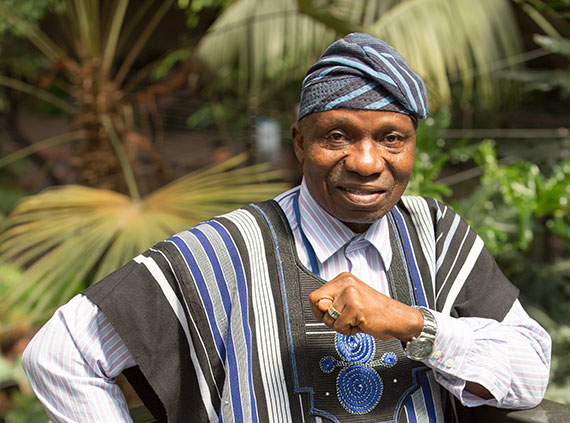
Johnson Oludeinde says he is using Wikipedia to expose corruption in Nigeria.
Photo by Victor Grigas, free licensed under CC BY-SA 4.0.
Why is it important that “every single human being freely share in the sum of all knowledge”, as stated in Wikipedia’s vision? Johnson Oludeinde Oluata, a Wikipedian from Nigeria, has a simple answer:
“This world will be better if we all have knowledge, if you know your rights, if there is equality, if there’s justice, then we will have peace,” says Oluata. “So I think it’s better not to hoard your knowledge.”
Oluata, known to his fellow editors as Joluata, thinks Wikipedia is a starting point for helping others improve their lives through shared knowledge. And readily available information on important topics, like corruption in Nigeria, can become a learning opportunity.
Among the many topics on Wikipedia, Oluata believes that corruption in Nigeria is a topic in desperate need of more public scrutiny and volunteer participation.
“Corruption is a global disease. If you want to fight corruption in Nigeria, it’s not only Nigeria that needs to fight. Other countries must join,” he says. “Because other countries provide the cover, the warehouse … They provide warehouses for corruption.”
In other words, other countries must recognize that if they are not joining forces to fight this practice, they are ultimately aiding the growth of corruption in Nigeria. So how can people from around the world participate?
By writing and editing corruption topics in Wikipedia, Oluata says. Through the work of many editors, people have already taken a stance in addressing Nigerian corruption by creating extensive articles that provide insights into the global dialogue on Nigerian corruption.
“All professionals should work together to kill corruption, not to commit it,” he says. “I’m always putting the problem of people in my head: there’s no money, they’re trying to have a better society. I don’t know how to go about it, but I try.”
Growing up in Ondo state, Oluata had a mentor named Donald Moore who taught him how to type, which eventually developed into an interest in computers. Throughout his professional career in accounting, he has given back by inspiring others, and exposing them to interests they would never expect to pursue.
As a part of the Cherie Blair Foundation, Oluata mentors women worldwide on business practices through Google Hangouts. Over time, he has become an avid advocate of “giving knowledge to people.” Currently, he is exploring ways to integrate Wikipedia into his mentoring work, but for now, his activities as an editor include writing on diverse topics related to Nigeria, as well as to business and accounting practices.
“Wikipedia is a source of knowledge … on a global scale, for everybody, for all professions, for all backgrounds,” says Oluata. “I mentor students who are doing their graduate and undergraduate studies, [and who need] a robust platform. That’s why I am interested in using Wikipedia to train people.”
Interview by Victor Grigas, Storyteller, Wikimedia Foundation
Profile by Yoona Ha, Assistant Storyteller, Wikimedia Foundation
Joe Sutherland, Wikimedia Foundation Communications volunteer

Can you help us translate this article?
In order for this article to reach as many people as possible we would like your help. Can you translate this article to get the message out?
Start translation